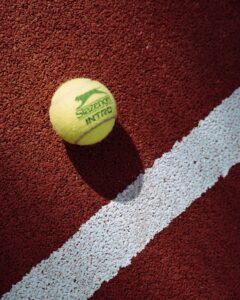The Role of Caffeine in Padel Players’ Recovery and Injury Prevention
3 min read
The Role of Caffeine in Padel Players’ Recovery and Injury Prevention
The Paddle Craze: Exploring the Benefits of Caffeine in Padel Performance
Padel, the exciting combination of tennis and squash, has taken the sporting world by storm. Its fast-paced nature and addictive gameplay have attracted a dedicated following of players looking to improve their skills and dominate the court. As with any sport, success in padel requires not only skill and strategy but also optimal physical condition. One method that has gained popularity among padel players is the consumption of caffeine, a natural stimulant known for its ability to enhance performance and aid in recovery.
Understanding the Role of Caffeine in Padel Performance
Before we dive into the benefits of caffeine in padel, let’s take a moment to understand what caffeine actually does. Caffeine is a stimulant that affects the central nervous system, providing a temporary boost of energy and mental focus. When consumed in moderate amounts, it can have numerous positive effects on athletic performance.
In the context of padel, caffeine can help players stay alert and focused during matches, improving reaction time and decision-making abilities. This heightened mental state can be especially advantageous during long and intense rallies where split-second decisions can make the difference between victory and defeat.
Caffeine as a Recovery Aid for Padel Players
Aside from its performance-enhancing properties, caffeine can also play a crucial role in the recovery process for padel players. The high-intensity nature of the sport can place significant stress on the body, leading to muscle soreness and fatigue. This is where caffeine’s ability to accelerate recovery comes into play.
Research has shown that caffeine can reduce muscle pain and soreness by blocking certain receptors in the brain that transmit pain signals. This means that consuming caffeine after a grueling padel session can help alleviate post-match discomfort and aid in faster recovery. It also boosts glycogen repletion, replenishing the energy stores that may have been depleted during gameplay.
Injury Prevention with the Help of Caffeine
Preventing injuries is of utmost importance for any padel player. A significant advantage of caffeine is its ability to enhance physical performance and reduce the risk of injury. By increasing alertness and focus, caffeine can help players maintain proper form and technique throughout the game. This can be especially beneficial in preventing common padel injuries such as sprains, strains, and joint pains.
Moreover, caffeine has been found to improve muscular strength and endurance, allowing players to exert more force and sustain high-intensity movements for longer periods. By reducing the onset of muscle fatigue, caffeine can help padel players maintain peak performance levels and reduce the risk of injury caused by exhaustion.
Optimizing Caffeine Consumption for Padel Players
While caffeine can undoubtedly enhance padel performance and aid in recovery, it is essential to optimize its consumption for maximum benefit. Here are a few guidelines to bear in mind:
- Timing: To maximize the effects of caffeine, consume it approximately 45 minutes before a padel match or training session. This allows enough time for it to be absorbed into the bloodstream and reach peak effectiveness.
- Hydration: Remember to stay hydrated by drinking water alongside your caffeinated beverage. Although caffeine has diuretic properties, the amount found in a typical serving is unlikely to cause dehydration.
- Dosage: The optimal caffeine dosage varies from person to person. It is generally recommended to consume between 3 to 6 milligrams of caffeine per kilogram of body weight. However, it is essential to listen to your body and adjust accordingly.
- Moderation: While caffeine does have numerous benefits, it is crucial to consume it in moderation. Excessive consumption can lead to adverse effects such as jitteriness, irritability, and disrupted sleep patterns. Always be mindful of your individual tolerance and avoid consuming caffeine close to bedtime.
Conclusion
Caffeine can undoubtedly have a positive impact on padel players’ performance, recovery, and injury prevention. By providing an energy boost, enhancing focus, and aiding in muscle recovery, caffeine can give players that extra edge on the court. However, as with any supplement, it is essential to approach caffeine consumption with caution and explore what works best for your individual needs. With the right balance, caffeine can be a valuable ally in your quest for padel greatness.







